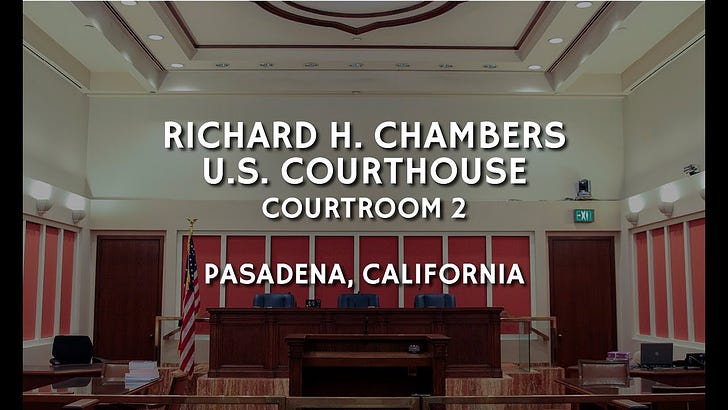Ninth Circuit to Decide if Every Convicted Felon loses his Second Amendment Rights Forever
US v. Steven Duarte
On December 4, 2023, a panel of three “Republican Judges” heard oral argument in a case where the Federal government conceded that the felonies the defendant was convicted of which resulted in a lifetime ban on his right to possess firearms* under Federal law which in turn led to his current Federal conviction for possessing firearms in violation of US Code 18 U.S.C. §922(g)(1) were non-violent felonies.
You and I might disagree that they were all non-violent felonies but parties are bound by their concessions and so, in the context of this case, all five of the prior convictions were for non-violent felonies.
The oral argument in US v. Steven Duarte quickly left no doubt that Judge Milan D. Smith is going to hold that any felony conviction for anything, no matter how trivial the underlying offense, categorically excludes forever that person from “The People” the Second Amendment protects. Moreover, Judge Smith has indicated that because they are categorically excluded from the protections of the Second Amendment, the government does not bear the burden, or any burden, to prove that the history and tradition of the Second Amendment showed that there was a national consensus during the relevant historical period (1791 and/or 1868) that any conviction resulted in a lifetime ban on the possession of firearms, no matter how trivial the crime so long as the crime was labeled a felony. Indeed, although it was like pulling teeth, the Biden administration conceded that if the State of California were to label any crime a felony, including jaywalking or removing the “Do Not Remove” labels from mattresses then a conviction for that trivial offense forever removes that person from the protections of the Second Amendment.
Judge Carlos Bea so frequently and vigorously shook his head in agreement with Judge Milan Smith that there really is not much doubt that he will join with Judge Smith leaving the possibility that Judge VanDyke will write a dissent.
A fun fact that was pointed out to me is that Judge Smith wrote the opinion in US v. Vongxay (2010) upholding the Federal firearms possession ban in the case of US v. Vongxay. I was well familiar with the Vongxay opinion in the Fourth Amendment context but I had long forgotten its author but remembered that the Federal public defender did an excellent job, considering the hand he was dealt.
The only way for Judge Smith’s opinion (as it applies to the Second Amendment) in US v. Vongxay to stand is if the government does not have to prove its position that every felony conviction, no matter how trivial the offense, excludes one from the protections of the Second Amendment.
I will close on a procedural law note given that judges will wallow through the mud to find some procedural law excuse not to answer the Constitutional question(s) before them, and that is this — Judge Smith repeatedly referenced the concurrences in NYSRPA v. Bruen as justification for not complying with the Second Amendment methodology required by the majority opinion in NYSRPA v. Bruen, and he did so contrary to binding 9th Circuit procedural law.
Ninth Circuit Court of Appeals procedural law prohibits every judge in this circuit from taking into account concurrences except in those rare cases where the Supreme Court opinion is “fractured” and even then judges are only allowed to look at concurrences in order to find a least common denominator. They are not allowed to cherry-pick from concurrences or go beyond the common denominator of the concurrences because to do so would make the judges legislators, not judges.
NYSRPA v. Bruen was not a fractured opinion. Six judges were in the majority. The only judges who said that judges should not be bound by the text, history, and tradition test mandated by the six-judge majority were the three judges in the dissent.
Although there have been Federal district court judges who have cited the dissent and Justice Kavanaugh’s concurrence to create a “five-justice majority” in defiance of the actual majority opinion in Bruen, I suspect that Judge Smith might not be so obvious in his written opinion but it costs him nothing to show a brazen disregard of the Supreme Court and so his written opinion could very well reflect his bias from the oral argument. Judge Smith knows that Federal judges have done so for decades and although Congress can remove him from the bench, it won’t unless (ironically) Judge Smith is convicted of a felony.
Judge Smith might write that NYSRPA v. Bruen did not make the decision in US v. Vongxay irreconcilable with Bruen and therefore Judge Smith’s opinion in US v. Vongxay still stands even if the Bruen opinion may have cast some doubt on its validity but that would only be to placate Judge Bea.
Here is a link to the CourtListener docket where many of the filings are free to download.
* The Federal prohibition on possessing firearms under 18 U.S.C. §922(g)(1) does not prohibit the possession of antique firearms as defined by Federal law.



